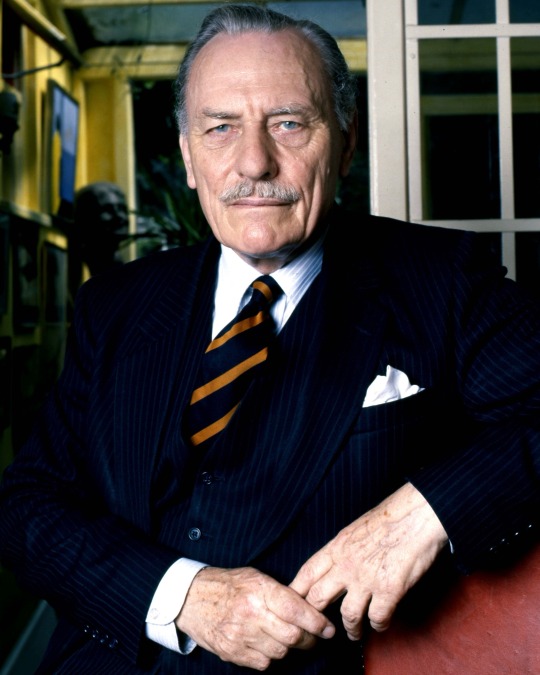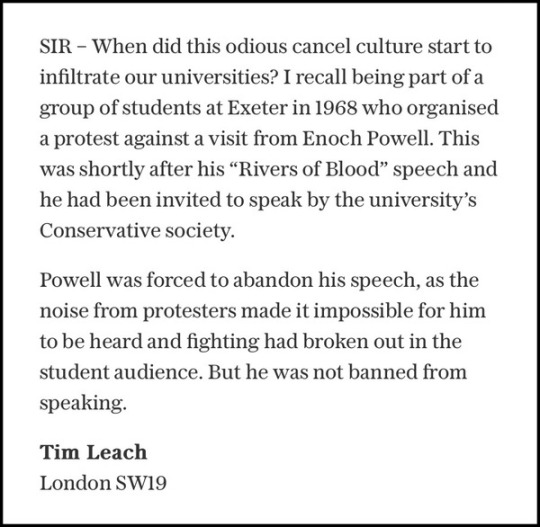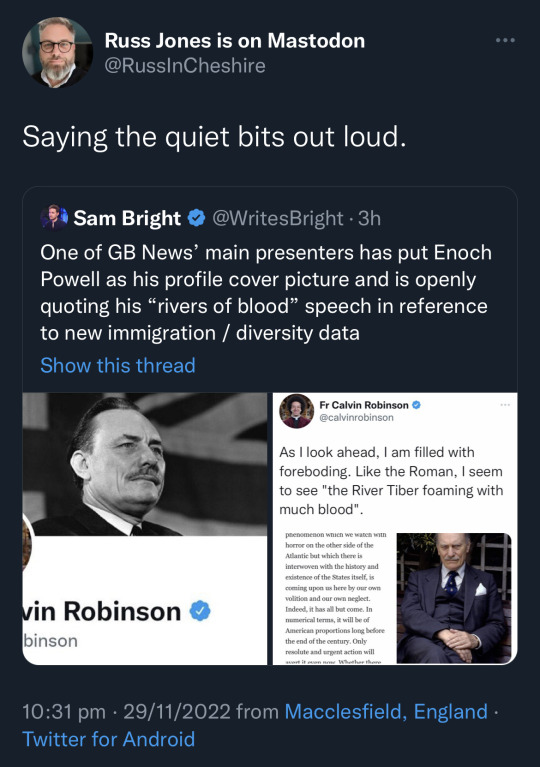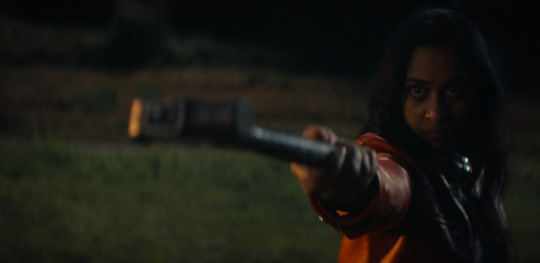#enoch powell
Text

"Too often today people are ready to tell us: 'This is not possible, that is not possible.' I say: whatever the true interest of our country calls for is always possible. We have nothing to fear but our own doubts."
Enoch Powell, born 16th June 1912
160 notes
·
View notes
Text
Wole Soyinka on West Indians in London. He incorrectly said Colin Powell instead of Enoch Powell. Funnily enough, Elombe Brath claimed that, in grammar school, Colin Powell called him a “nigger” during an argument. Elombe chased him up the stairs and punched him in the mouth.
6 notes
·
View notes
Text

Ceux que les dieux veulent détruire, ils les rendent d’abord fous. Nous devons être fous, littéralement fous, en tant que nation pour permettre l’arrivée annuelle de quelque 50 000 personnes à charge, qui sont pour la plupart le matériau de la croissance future de la population issue de l’immigration, descendants d’immigrés. C’est comme si nous observions une nation occupée à dresser son propre bûcher funéraire. Nous sommes si fous que nous permettons à des personnes non mariées d’immigrer dans le but de fonder une famille avec des époux et des fiancés qu’ils n’ont jamais vus.
J’en viens à la réémigration. Si toute l’immigration cessait demain, le taux de croissance de la population immigrée et de la population issue de l’immigration serait considérablement réduite, mais la taille potentielle future de cet élément de la population ne diminuerait pas pour autant le caractère fondamental du danger qu’il représente pour la nation.
D’où l’urgence de mettre en œuvre dès maintenant le deuxième volet de la politique du Parti conservateur : l’encouragement à la réémigration.
Enoch Powell, 1968
3 notes
·
View notes
Text

Enoch Powell
#suitdaddy#suiteddaddy#suit and tie#silver fox#suited daddy#silverfox#daddy#men in suits#british man#british men#suit daddy#suitedman#suited men#suited grandpa#suited man#Enoch Powell#uk conservative party#member of parliament#house of commons#Suitfetish
40 notes
·
View notes
Text

…wait, what?
#Daily Telegraph#University#Cancel culture#Odious#Enoch Powell#Students#Rivers of blood#Exeter#So we protested#And fought#And made it impossible for him to speak#And it was called off#But that wasn’t cancel culture#Oh no#That was different#Not like today#Bloody students#Not letting people speak#Bastards
15 notes
·
View notes
Photo

There are some things which get on ones nerves and some things that don't. And I'm allergic to the things that are typically American. I think thats fairly natural to someone who has just been described as a Tory and is always ready to describe himself as a High Tory.
- Enoch Powell
This isn’t a slight againt America or its politics and culture. But rather an acknowledgement that conservatism, in its purest form, is rooted to a specific place and its unique customs, distinguished heritage, and ancient traditions. Every country will have its own form of conservative thought and shaped from the wellspring of its own history and culture. Unlike socialism which starts from a rigid ideological position and implements cookie cutter solutions regardless of the uniqueness of the social and political culture.
#powell#enoch powell#quote#british conservatism#tory#conservative#high tory#ideology#politics#politician#british#icon
43 notes
·
View notes
Text

6 notes
·
View notes
Text
The Ongoing Struggle
In the West we have nurtured tolerance, this is Scriptural. Muslims only see the world through the madmanMohamed's eyes, so there is no hope for a place of Sense, Empathy, or Truth. They will carry on until our Creator says "ENOUGH"!
So the west has two main problems - with little UK, feeling it more than most.
Every country has to deal with illegal entrants. Some are not dealing very well, because of the amount of socialists interfering with the government policies. It has been a long and misinformed struggle since the audacity of the 'main-chance-seekers' have given the west, simply by grasping the idea of asylum-seekers.
youtube
Ireland needs to do it the same way as we are struggling to do it. Socialism or Capitalism is the struggle, and whilst one may sound humane over the other one, it does not work out that way. People who have their livelihoods taken from them is the real outcome of socialism ... all in the name of tolerance and 'human rights' ... and what a stupid term that is. You give one party their supposed human rights, which means their opposites end up having THEIR human rights denied/taken away!!
#asylum seekers#welfare seekers#socialism#capitalism#fairness and justice#human rights#anti human rights#enoch powell#IslamOUT#madmanMohamed#Youtube
0 notes
Text
💥Enoch Powell Responds to Being Called A Racist | The Dick Cavett Show💥
youtube
#duttylingo#windrush#slavery#transatlantic#british empire#windrushgeneration#enoch Powell#racism#Youtube
0 notes
Text
How a past Wellingborough by election almost saw the nemesis of my career in journalism
Wellingborough By Election. John Mann of the Labour Party, canvassing outside the John White factory. ;November 1969 Pic credit: Alamy and Trinity Mirror
Tomorrow’s Wellingborough by-election brings back memories of an earlier by-election there 55 years ago which nearly ended my career.
The election was triggered by the death of the sitting Labour MP. Harry Howarth and was won by the Tory…

View On WordPress
0 notes
Text
Pit race against race, religion against religion, prejudice against prejudice. Divide and conquer! We must not let that happen here.”
― Eleanor Roosevelt
Remember the last election? The one where the oh-so-morally-pure Conservative Party branded Jeremy Corbyn a racist?
“Corbyn's politics branded 'racist’ by Priti Patel in fiery House of Commons response.” (Express: 16/07/20)
The sheer hypocrisy of the Tory Party knows no bounds. The Tories have deliberately chosen as their mayoral candidate for London, a woman who is totally unabashed about playing the race card in her inglorious bid for power.
Susan Hall, the hard-right candidate for the Tory Party, has been condemned for promoting Islamophobic rhetoric She has been actively suggesting that Jewish people are frightened of the Muslim mayor, Sadiq Khan, in a vain attempt to win the Jewish vote. Unfortunately for Ms Hall, many within the London Jewish community are not taken in by her lies and rightwing propaganda, the Board of Deputies of British Jews publicly rejecting her claims.
The disturbing truth is the Jewish community should be fearing Susan Hall, not Sadiq khan. Ms Hall, it has been discovered, retweeted controversial posts with the picture of the racist Enoch Powell and the words “It’s never too late to save your country". Save our country from who Ms Hall? Black people? Asians? Jews? Muslims?
To make matters worse, Ms Hall in an interview on LBC, made the claim:
“...she “cant remember” backing a post by Katie Hopkins which described Sadiq Khan as “our nipple height mayor of Londonistan.” (LBC: 27/09/230
But playing the race card is nothing new in London mayoral elections. Only a few years ago it was Conservative candidate Zac Goldsmith who used that tactic.
“…Goldsmith waged a campaign soaked in racism, in one of the most ethnically diverse cities on Earth, shamelessly exploiting anti-Muslim prejudices in an effort to secure a shameful victory.” (Guardian: 07/05/16)
But there is one big difference between then and now. Zak Goldsmith had a reputation before his racist campaign as a “liberally minded, eco-friendly Tory”. Ms Hall, by contrast is a far-right politician who actually believes her own rhetoric.
1 note
·
View note
Text

There was a saying, not heard today so often as formerly . .
“What do they know of England who only England know?”
It is a saying which dates. It has a period aroma, like Kipling’s Recessional or the state rooms at Osborne. That phase is ended, so plainly ended, that even the generation born at its zenith, for whom the realisation is the hardest, no longer deceive themselves as to the fact. That power and that glory have vanished, as surely, if not as tracelessly, as the imperial fleet from the waters of Spithead.
And yet England is not as Nineveh and Tyre, nor as Rome, nor as Spain. Herodotus relates how the Athenians, returning to their city after it had been sacked and burnt by Xerxes and the Persian army, were astonished to find, alive and flourishing in the blackened ruins, the sacred olive tree, the native symbol of their country.
So we today, at the heart of a vanished empire, amid the fragments of demolished glory, seem to find, like one of her own oak trees, standing and growing, the sap still rising from her ancient roots to meet the spring, England herself.
Perhaps, after all, we know most of England “who only England know”.
So the continuity of her existence was unbroken when the looser connections which had linked her with distant continents and strange races fell away. Thus our generation is one which comes home again from years of distant wandering. We discover affinities with earlier generations of English who felt no country but this to be their own. We discover affinities with earlier generations of English who felt there was this deep this providential difference between our empire and those others, that the nationhood of the mother country remained unaltered through it all, almost unconscious of the strange fantastic structure built around her – in modern parlance “uninvolved”.
Backward travels our gaze, beyond the grenadiers and the philosophers of the 18th century, beyond the pikemen and the preachers of the 17th, back through the brash adventurous days of the first Elizabeth and the hard materialism of the Tudors and there at last we find them, or seem to find them, in many a village church, beneath the tall tracery of a perpendicular East window and the coffered ceiling of the chantry chapel.
From brass and stone, from line and effigy, their eyes look out at us, and we gaze into them, as if we would win some answer from their silence.”Tell us what it is that binds us together; show us the clue that leads through a thousand years; whisper to us the secret of this charmed life of England, that we in our time may know how to hold it fast”.
“What would they say”?
They would speak to us in our own English tongue, the tongue made for telling truth in, tuned already to songs that haunt the hearer like the sadness of spring. They would tell us of that marvellous land, so sweetly mixed of opposites in climate that all the seasons of the year appear there in their greatest perfection; of the fields amid which they built their halls, their cottages, their churches, and where the same blackthorn showered its petals upon them as upon us; they would tell us, surely of the rivers the hills and of the island coasts of England.
One thing above all they assuredly would not forget; Lancastrian or Yorkist, squire or lord, priest or layman; they would point to the kingship of England, and its emblems everywhere visible.
They would tell us too of a palace near the great city which the Romans built at a ford of the River Thames, to which men resorted out of all England to speak on behalf of their fellows, a thing called ‘Parliament’; and from that hall went out their fellows with fur trimmed gowns and strange caps on their heads, to judge the same judgments, and dispense the same justice, to all the people of England.
Symbol, yet source of power; person of flesh and blood, yet incarnation of an idea; the kingship would have seemed to them, as it seems to us, to express the qualities that are peculiarly England’s: the unity of England, effortless and unconstrained, which accepts the unlimited supremacy of Crown in Parliament so naturally as not to be aware of it; the homogeneity of England, so profound and embracing that the counties and the regions make it a hobby to discover their differences and assert their peculiarities; the continuity of England, which has brought this unity and this homogeneity about by the slow alchemy of centuries.
For the unbroken life of the English nation over a thousand years and more is a phenomenon unique in history, the product of a specific set of circumstances like those which in biology are supposed to start by chance a new line of evolution. Institutions which elsewhere are recent and artificial creations appear in England almost as works of nature, spontaneous and unquestioned.
From this continuous life of a united people in its island home spring, as from the soil of England, all that is peculiar in the gifts and the achievements of the English nation. All its impact on the outer world in earlier colonies, in the later Pax Britannica, in government and lawgiving, in commerce and in thought has flowed from impulses generated here. And this continuing life of England is symbolised and expressed, as by nothing else, by the English kingship. English it is, for all the leeks and thistles grafted upon it here and elsewhere. The stock that received all these grafts is English, the sap that rises through it to the extremities rises from roots in English earth, the earth of England’s history. We in our day ought well to guard, as highly to honour, the parent stem of England, and its royal talisman; for we know not what branches yet that wonderful tree will have the power to put forth.
The danger is not always violence and force; them we have withstood before and can again.
The peril can also be indifference and humbug, which might squander the accumulated wealth of tradition and devalue our sacred symbolism to achieve some cheap compromise or some evanescent purpose.
Enoch Powell MP, Minister of Health, to The Royal Society of St George, London, St George’s day 1961
77 notes
·
View notes
Text
Black Mirror 6x05: "Demon 79"
Black Mirror
6×05: “Demon 79”
Directed by Toby Haynes
Written by Charlie Brooker & Bisha K. Ali
* For a recap & review of the penultimate episode, click here.
Northern England, 1979.
“Bright Eyes” by Art Garfunkel plays. Nida Huq (Anjana Vasan) wakes up, gets ready for the day, prepares a lunch to take with her to work, puts on some makeup, and she’s out the door; before she goes, we see an old…

View On WordPress
#1979#Apocalypse#Art Garfunkel#Bobby Farrell#Boney M#Demon#Enoch Powell#Gaap#National Front#Racism#Tannhauser#Wagner#White Nationalism
0 notes
Text
Today's Inspiration

View On WordPress
1 note
·
View note
Quote
If my ship sails from sight, it doesn't mean my journey ends; it simply means the river bends.
Enoch Powell
0 notes
Text
Tories and racism in the 1970s
The Tories and racism in the 1970s - the awful things MPs said in parliament
Where were the Tories on the question of racism in the 1970s? This is especially pertinent given accusations in recent years of anti-Muslim prejudice within the Conservative party. Though equally, it’s astounding to see so many Asian heritage ministers in a Conservative government today when this would have been unthinkable in the 70s and 80s.
So what did Thatcher and the people around her think…
View On WordPress
#1970s#1980s#alien#Asian#black#culture#cultures#enoch powell#immigration#John Stokes#MP#multi-racial#race#race relations#racism#rivers#Thatcher#West Indian#Winston Churchill
1 note
·
View note